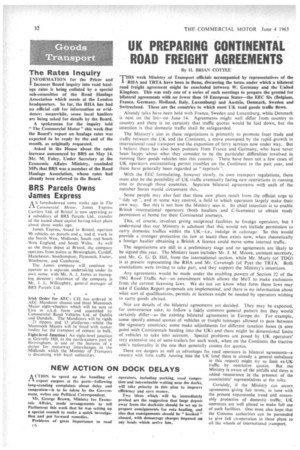UK PREPARING CONTINENTAL ROAD FREIGHT AGREEMENTS
Page 34

If you've noticed an error in this article please click here to report it so we can fix it.
By H. BRIAN COTTEE THIS week Ministry of Transport officials accompanied by representatives of the RHA and TRTA have been in Bonn, discussing the terms under which a bilateral road freight agreement might be concluded between W. Germany and the United Kingdom. This was only one of a series of such meetings to prepare the ground for bilateral agreements with no fewer than 10 European States—the EEC Six (Belgium, France, Germany, Holland, Italy, Luxemburg) and Austria, Denmark, Sweden and Switzerland. These are the countries to which most UK road goods traffic flows. Already talks have been held with France, Sweden and Luxemburg, while Denmark is next on the list—on June 14. Agreements might well differ from country to country and there is no certainty that traffic quotas would be laid down, but the intention is that domestic traffic shall be safeguarded.
The Ministry's aim in these negotiations is primarily to promote freer trade and traffic between the UK and the Continent, a move prompted by the rapid growth in international road transport and the expansion of ferry services now under way. But I believe there has also been pressure from France and Germany, who have never been happy about what they consider to be the particular difficulties involved in running their goods vehicles into this country. There have been not a few cases of UK operators encountering permit troubles on the Continent in the past year, and these have generally been regarded as "reprisals ".
With the EEC formulating, however slowly, its own transport regulations, there must also be the possibility of UK traffic eventually facing new restrictions in running into or through those countries. Separate bilateral agreements with each of the member States would circumvent this.
Some people may also feel that these new plans result from the official urge to "tidy up ", and in some way control, a field in which operators largely make their own way. But this is not how the Ministry sees it. Its chief intention is to enable British international operators (both hauliers and C-licensees) to obtain ready permission at home for their Continental journeys.
This, of course, involves giving reciprocal facilities to foreign operators, but I understand that our Ministry is adamant that this would not include permission to carry domestic traffics within the UK—i.e., indulge in cabotage. So this would provide a stronger protection (in law at least) than exists now, when theoretically a foreign haulier obtaining a British A licence could move some internal traffic.
The negotiations are still in a preliminary stage and no agreements are likely to be signed this year. The Ministry team includes Mr. J. M. Moore, assistant secretary, and Mr. G. G. D. Hill, from the international section, while Mr. Murly (of TDG) is at present representing the RE-IA and Mr. Cavanagh (of Pye) the TRTA: Both associations were invited to take part, and they support the Ministry's intentions. .
Any agreements would be made under the enabling powers of Section 22 of the 1962 Road Traffic Act—an amendment which allows the MoT to make exclusions from the current licensing laws. We do not yet know what form these laws may take if Geddes Report proposals are implemented, and there is no information about what sort of qualifications, permits or licerices might be needed by operators wishing to carry goods abroad.
Nor are details of the bilateral agreements yet decided. They may be expected, for convenience sake, to follow a fairly common general pattern but they would certainly differ—as the existing bilateral agreements in Europe do. For example, some specify annual quotas of vehicles or freight tonnages allowed to pass between the signatory countries; some make adjustments for different taxation bases (a sore point with Continentals hauling into the UK) and there might be dimensional limits of vehicles to take into account. Special problems are posed by UK operators' very extensive use of semi-trailers for such work, when on the Continent the tractive unit's nationality is the one that generally counts for quotas.
There are dangers as well as advantages for road operators in bilateral agreements—a country with little traffic running into the UK (and there is already a general unbalance in this respect) might try to limit ex-UK traffic by restrictive quotas. But the Ministry is aware of the pitfalls and there is added reassurance in the presence of the associations' representatives at the talks.
DOCK DELAYS
Certainly, if the Ministry can secure agreements giving fair terms, in tune with the present expansionist trend and reasonably protective of domestic traffic, UK operators are well placed to make full use of such facilities. One must also hope that the Customs authorities can be pursuaded to give full co-operation in these plans to oil the wheels of international transport.
























































































































